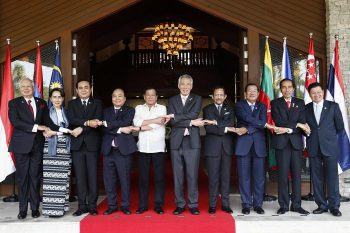

 June 2017 • Note 24 •
June 2017 • Note 24 •
In recent years, China’s Xi Jinping has been testing the attractiveness of its authoritative and sophisticated « model » in the countries of South-East Asia. Can the introduction of « democratorship » in countries such as Thailand, Malaysia and the Philippines be seen as an effect of the strengthening of the Chinese model and its attraction in the eyes of these regimes? It seems so: in China as in these countries, democracy and the rule of law are increasingly seen as utopias endangering stability and prosperity.
The time is long gone when Western countries would dream of a world moulded in their image and where the democratic project embodied the promise of a certainly brighter future. After the political unrest of the 1997 crisis, we thought the case had been settled in South-East Asia: the authoritarian debacles which had largely fuelled the turmoil left hope for the implementation of mechanisms involving beneficial democratic progress for all citizens, i.e., a rule of law guaranteeing civil, legal, and political equality.
But in vein: in addition to a rapid resumption of growth through the Chinese powerhouse (a recovery that literally suspended the implementation of the reforms), the events of 11 September 2001 had a double impact on this renovation by weakening the newly-instituted democratic structures and mechanisms and reinstating a military factor (Armed Forces) in the political space. From spasmodic upheavals to deep crises, the political transformation of South-East Asia does not occur linearly; the unbridled excesses that we see today augur a bleak future for democratic transitions.
Among the processes and interactions at work, the Chinese factor is not the least. This factor is expressed on multiple fronts by creating interdependencies that confine leaders like corporations more or less closely to flows that could potentially tie the region to dependency patterns it seems appropriate to explore in greater depth. With a crucial underlying question: is the concomitant timing of the Chinese pressures and the authoritarian temptation as manifested in South-East Asia coincidental? What does it announce?
The more or less ostentatious Chinese pressures according to fields occur in the context of globalisation, a globalisation historically marked by colonial influences and involving power relations with the outside world and self-compromise. Precisely today, we observe a feeling of resistance in the face of Westernisation, initially imposed by colonisation and secondly, by a liberal globalisation that has long touted, in an abrasive and pompous package, the merits of « market democracy »; Asian values believed had been shelved after the citizen protests following the 1997 crisis, were masterfully revived by Xi Jinping to explain the refusal to fall into the dictates of individual rights and political competition arbitrated by a manipulated electorate and to flatter conquering nationalism. The self-compromise takes the form of the defence of interests acquired on behalf of higher interests to defend and political cultures to defend. The famous universality of democratic values is in the spotlight; it is in the field of ideas and values that China now wants to make its mark.
This questioning feeds both of the crisis affecting Western countries and the supposed attractiveness of the Chinese model. For now, the telescoping bias of time is playing in favour of China. The persisting economic weakness of the European Union, the slowdown in the US and the geopolitical, migratory, and civilizational challenges faced by these regions have undermined the evidence that a political regime based on the guarantee of freedoms will necessarily favour growth and development, and ultimately increase a nation’s power. The rise of populism in Europe, Brexit and Donald Trump’s election as President of the United States are all events that questioned very deeply by South-East Asia with regard to the relevance, or even the merits, of democratic practice. Conversely, the growth experienced in China in the past 30 years, its ability to enforce stability and increase its power on the international stage reinforces the interest in decoupling political freedoms from economic freedoms. Furthermore, the presence of an elite united by converging and active interests, which controls and submits the rest of society, might become a necessary condition for power, given that this elite « corrects » any errors of public opinion in the name of the national interest. It is this new authoritarian balance that the Chinese authorities increasingly contrast with democratic shortfalls and risks; and South-East Asia is the proving ground of choice.
Thus, since the financial crisis 2008, we have observed a gradual but substantial authoritarian trend that takes different forms in different states but signals a distancing from democratic governance, or more simply the rule of law, to which incidentally, the leaders, or even corporations, have never fully subscribed. Between authoritarian temptation, democratic corruption, and the new requirements of citizens, it is difficult to clearly read the political developments in South-East Asian countries. Any comparison may turn out to be simplistic. However, three states appear to be more at risk than others and deserve particular attention: Malaysia, Thailand, and Philippines. These nations will now provide the illustrations to our hypotheses.
